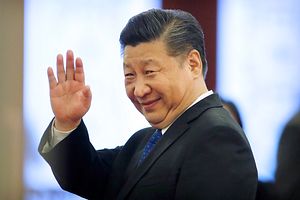With U.S. President Donald Trump maintaining his strong stance on a tit-for-tat trade standoff with China, Chinese President Xi Jinping announced a series of plans to further open China’s market. Even though neither Xi himself nor China’s state media will admit it, it’s an apparent concessional response to U.S. pressure.
China is currently holding the annual Boao Forum for Asia (BFA) under the theme of “An Open and Innovative Asia for a World of Greater Prosperity” on Hainan Island. On April 10, Xi gave the keynote speech at the opening ceremony of this year’s conference.
Notably, days ahead of the speech, Beijing had launched a big promotional campaign at home and abroad, hinting that Xi would unveil significant decisions during the event. Some Chinese-language websites — operated in foreign countries but believed to have close connections with Beijing — had already “forecasted” Xi’s decision in detail.
Sure enough, as predicted, Xi announced detailed plans to further open up China’s economy.
According to Xi, China’s “opening up plans” include relaxing restrictions on the establishment of foreign financial institutions, particularly in the banking, securities, and insurance industries; “significantly” lowering import tariffs for foreign products, particularly for automobiles; enhancing law enforcement to protect intellectual property of foreign firms; increasingly opening up the manufacturing sector, particularly the automotive, aircraft, and shipbuilding industries to foreign investment; and improving the investment environment for all foreign investors.
“China does not seek trade surplus,” Xi said, “We have a genuine desire to increase imports and achieve greater balance of international payments under the current account.”
Xi emphasized that all these “significant measures” will be implemented “as soon as possible.”
“China’s opening up will certainly open a new chapter,” he added.
Meanwhile, Xi didn’t forget to criticize “Cold War thinking,” “zero-sum games,” unilateralism, and protectionism in his speech.
“We must not engage in a zero-sum game or bully one’s neighbors,” he said. “We must properly manage and control contradictions and strive to achieve long-lasting peace.”
Although Xi didn’t mention the United States or Trump in his address, it’s apparent that his remarks centered around recent moves by Washington. The announced measures responded to the Trump’s administration’s most recent complaints.
However, perhaps in an attempt to save face, China’s state media decided to maintain an aggressive tone against the United States regardless.
People’s Daily, for example, published a commentary soon after Xi’s latest speech, highlighting that China’s new opening up measures are not concessions under the U.S. trade pressure, but a long-planned national strategy.
“China’s new measures will benefit many trading partners, but [those measures] won’t apply to those countries that violate the rules of the WTO and wage trade wars against others!” this commentary exclaimed, without elaborating.

































